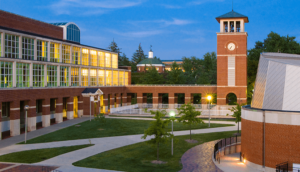
I was brought up always assuming that I would spend at least four years after high school on a typical college campus pursuing a degree that would lead me into a job.
The earliest memories of thinking about my future consisted of answering one common question from family, friends, and teachers: “what do you want to be when you grow up?” My answer was constantly changing throughout my childhood. I wanted to be a teacher, a doctor, and a psychologist. When thinking about this question, I always saw my future career as requiring a college education. All the adults I looked up to had gone to college and it never even occurred to me that there was another viable option.
This perspective can be attributed to my upbringing in a more affluent suburb of St. Louis where professionals are mostly viewed as role models in the community. Workers and tradespeople were usually respected but never looked to as people who I could learn from or aspire to be in my future. Since the average working conditions and wages of the working class are rarely adequate to live off of, it makes sense that my mentors would expect me to attend college and pursue a professional career. It is especially understandable that I would be expected to pursue higher education due to the quality of public education I had access to and the other lack of barriers due to my economic class and race.
Now, as I have learned more and gained more perspective, I do consider the idea that pursuing higher education is not for everyone to be true to a certain extent. In “Kid, I’m Sorry, but You’re Just Not College Material,” Michael J. Petrilli makes an argument that a college education is not a viable option for everyone. He argues that it is a waste of effort and time for students that are “not cut out for college” to even try and that focusing on a trade is a much better option for young people in disadvantaged economic situations to “another road to the middle class.”

Trade jobs can be high paying and rewarding, but everyone deserves the opportunity to go into whatever career path they feel called to.
I have mixed feelings on this article. On one hand, I agree that college is not the only viable option to attain a career and that trade jobs are just as essential to our communities as professional ones are. But on the other hand, I feel that this article glosses over the fact that receiving an education is just as much about learning as it is about securing future job opportunities. My first semester in college has provided me with enhanced intrapersonal skills, critical thinking abilities, and has made me a better member of society. These are skills that I believe to be beneficial to anyone, regardless of if they work a professional job or a trade job. Experience in critical thinking and problem-solving could help those in trade jobs to learn how to unionize or secure a leadership position in their job. Viewing college as simply a means to an end (a job) is an inaccurate analysis of the purpose and effect of education. I feel that narratives like Petrilli’s which deem some people “fit” and some “unfit” to attend college only exacerbate the idea that those who are financially secure are the only ones who should get the privilege of the benefits of having an education.
Petrilli also completely fails to recognize the outside factors which may be influencing how well students perform in school to determine who should and shouldn’t attend. I didn’t have to deal with food insecurity, lack of healthcare, or racism when going through my elementary education. But a lot of students do. To deem a student who didn’t perform well in school unworthy of receiving an education is simply unfair. There is a stereotype surrounding college-goers among the working class that they are elitist. This stereotype stems from the reality of inequality of opportunity in our country which alienates the working class from even the middle class in terms of prospects for education. It is no wonder that this stereotype exists, it does come across as elitist to praise a college education for your success when higher education isn’t accessible to everyone.
I do recognize although college education is important to me, not everyone wants or needs to go to college for their own personal goals. The main point I can agree with in Petrilli’s argument is that trade jobs are just as essential as professional jobs. However, the way he analyzes higher education from a strictly economic perspective I find to be extremely troubling. Petrilli seems to be operating under the presumption that nothing can be done within our government to improve access to education for those who desire it. I was lucky to have the upbringing, elementary education, and economic situation that I did. Those factors were extremely significant in the amount I was able to succeed in my education. But I don’t think that means that I deserve the opportunity of education any more than someone who did not also have these privileges. Now, I have the perspective that some sort of college education should be an option available for everyone regardless of their ability to pay for it or the ability to thrive academically in school. I think that rather than framing the college question in terms of excluding and discouraging certain people from the opportunity to attend college, we should be aiming to implement policy within our government that gives the option of tuition-free public college. So that everyone at least has the choice to go to college. So that when children across the United States are asked: “what do you want to be when you grow up?” their dreams aren’t restricted by economic class, race, or zip code.